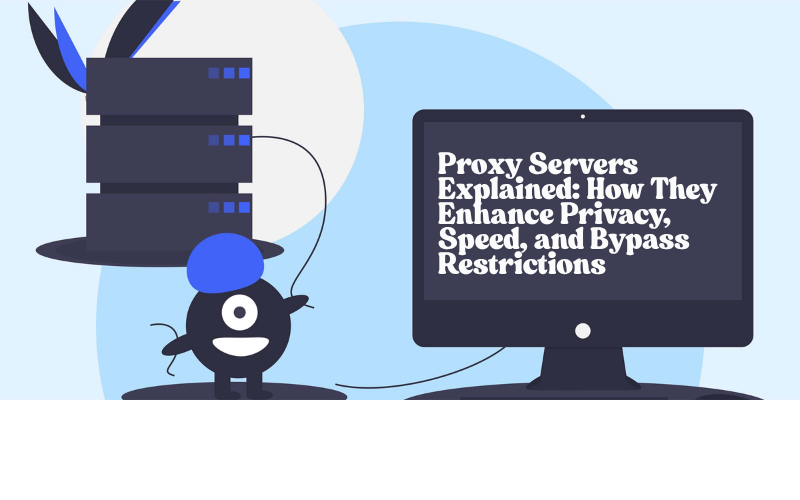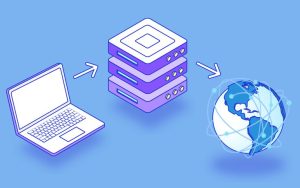Proxy Servers are essential tools in today’s digital landscape for maintaining online privacy, bypassing restrictions, and optimizing internet performance. Instead of connecting directly to a website, your device sends requests through an intermediary system, which then communicates with the target site on your behalf.
Over the years, proxy servers have evolved from simple traffic handlers to sophisticated tools for security, anonymity, and business operations. Understanding their role and functionality is essential for anyone navigating the modern web.
What Is a Proxy Server?
A proxy server acts as a bridge between your device and the destination server (such as a website). When you access a site using this intermediary, your request is first received and processed by the proxy before reaching the final destination.
This setup offers several advantages, particularly in enhancing privacy and strengthening corporate network security.
👉 Example: If you are in Vietnam and want to access a website available only in the U.S., connecting through a server with an American IP address will make it appear as if you are browsing from the United States.
(Source: Cloudflare Proxy Guide – DoFollow)
🔗 Related reading: Understanding IP Addresses (Internal Link)
How Do Proxies Work?
When you browse the internet normally, your device sends HTTP or HTTPS requests directly to a website’s server. With a proxy in place, the process changes slightly:
-
Your device forwards the request to the proxy.
-
The proxy evaluates, modifies if necessary, and relays the request to the destination server.
-
The server responds to the proxy.
-
The proxy passes the response back to you.
Throughout this interaction, the web server only sees the proxy’s IP address, effectively masking your own and adding a layer of anonymity.
(Source: Imperva – What is a Proxy? – DoFollow)
Key Benefits of Using Proxies
-
Enhanced Online Privacy
Masking your real IP address protects you from hackers, advertisers, and surveillance efforts. -
Bypassing Geographic Restrictions
Access websites and services that are limited to certain regions by appearing to browse from another location. -
Improved Speed and Load Management
Organizations often cache frequently accessed content through proxy servers, improving load times and balancing network traffic. -
Content Filtering and Monitoring
Schools and businesses use intermediary servers to control access to inappropriate or non-productive sites. -
Web Scraping and Data Collection
Companies rely on proxy networks to gather data anonymously without triggering blocks.
Example: SEO firms often deploy hundreds or thousands of IP addresses to safely scrape search engine results.
(Example: SEO firms often deploy hundreds or thousands of IP addresses to safely scrape search engine results.)
(Source: Kinsta Blog – Proxy Servers – DoFollow)
🔗 Related reading: Top Use Cases for Residential Proxies (Internal Link)
Common Types of Proxy Servers
| Type | Description |
|---|---|
| HTTP Proxy | Handles regular web traffic. |
| HTTPS Proxy | Supports secure, encrypted traffic. |
| SOCKS Proxy | Manages diverse traffic types, including email and torrents. |
| Transparent Proxy | Intercepts traffic without hiding IP addresses. |
| Anonymous Proxy | Conceals your real IP completely. |
| Residential Proxy | Uses IPs assigned to real homes, making them harder to detect. |
| Datacenter Proxy | Offers high speed but can be easier to block. |
(Source: Geonode – Types of Proxies – DoFollow)
Real-World Applications of Proxies
-
Accessing Netflix Libraries: View different regional catalogs by routing your connection through various countries.
-
Business Research: Collect competitor insights without revealing your identity.
-
Gaming Optimization: Reduce latency and lag by connecting through faster network paths.
Proxy technology not only enhances personal privacy but also supports businesses in their digital strategies.
🔗 Related reading: How VPNs and Proxies Differ (Internal Link)
Are Proxies Legal?
Using proxy servers is legal in most countries. However, utilizing them for unlawful activities or to breach service agreements may result in penalties. Always use proxy services responsibly and ensure compliance with applicable laws.
(Note: Some platforms, like Netflix, explicitly prohibit the use of proxies in their terms of service.)
(Source: Netflix Terms of Use – DoFollow)
Conclusion
Proxy servers are invaluable tools for boosting privacy, overcoming restrictions, and improving online performance. By understanding how they work, users can make informed decisions to better protect their digital presence.
Whether for personal or business purposes, selecting the right proxy solution can significantly enhance your internet experience.
Related articles: Understanding IP Addresses | How VPNs Work | Top Use Cases for Residential Proxies


